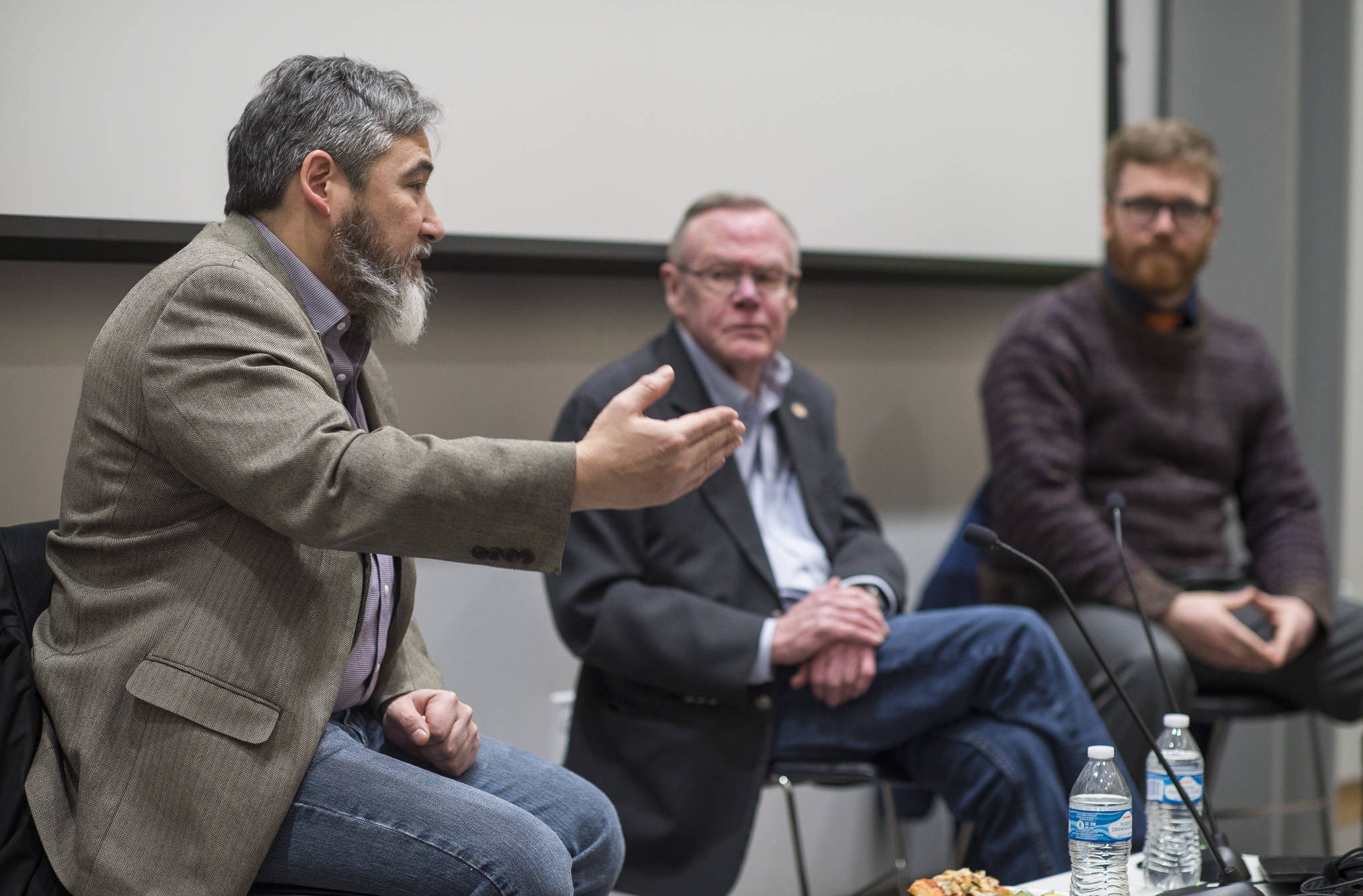Juneau’s three-person delegation to the Alaska Legislature told a well-attended town hall meeting Thursday night that they are worried about what will and will not happen in the upcoming legislative session.
Alaska faces a $2.5 billion annual deficit in the fiscal year that starts July 1, and the state is not expected to have enough money in its principal savings accounts to make ends meet. Lawmakers will be asked whether they want to spend from the Alaska Permanent Fund, to cut costs, to impose new taxes or fees, or some combination of all three.
“I’m worried about what’s going to happen. It’s an election year and a lot of times, well, every two years, a lot of things don’t happen because people are running for re-election and they’re afraid to tackle major issues. That concerns me,” said Sen. Dennis Egan, D-Juneau.
For almost three hours, Egan shared the floor of the Mendenhall Valley Public Library’s meeting room with Rep. Sam Kito III, D-Juneau, and Rep. Justin Parish, D-Juneau. Fifty-three people were present for the meeting, whose crowd spilled out of the room and into the library’s lobby. The delegation served pizza to those who attended, and between bites, attendees proffered some tough questions.
One of the biggest: Why hasn’t the Alaska Legislature already solved the state’s budget woes?
All three men said at least part of the problem is the deep divide between the Republican-led Senate Majority and the coalition House Majority. The majority in the Senate has advocated a deficit solution that includes only a draw from the Permanent Fund and relies on rising oil prices or budget cuts to resolve the rest.
The House Majority feels that solution puts too much of the burden on the shoulders of poorer Alaskans, since spending from the Permanent Fund would involve cutting the Permanent Fund dividend equally for poor Alaskans as well as rich Alaskans. The House Majority, with Parish and Kito among its members, has been reluctant to spend from the Permanent Fund without also approving a progressive income tax to balance the burden. The Senate Majority rejected that income tax last year and has maintained its opposition.
“Having individuals in the Senate that believe they can wait us out is, I think, part of the problem,” Kito said of the Senate Majority.
Parish responded, “Do you have a friend in Fairbanks? Please have them call their senator.”
Kito and Parish each said public pressure is needed if Alaskans want to see something beyond spending from the Permanent Fund and cuts to the Permanent Fund Dividend this year.
When another person asked why the divide is so stark, Kito responded that Alaska isn’t alone. Several other states across the country had problems passing a budget in 2017, with several partially or wholly shutting down their state governments after lawmakers failed to pass a budget in time.
“We are not unique,” Kito said.
“There’s something wrong with the system that we’ve got right now that allows that to take place,” he added.
With or without the divide between House and Senate, lawmakers are likely to approve some kind of spending from the Permanent Fund. Gov. Bill Walker’s proposed budget calls for it, and Egan said the real question is whether lawmakers will do it on a one-time basis or set up a system for recurring draws from the fund. Creating that system would give fund managers some kind of surety and allow them to better manage the state’s investments while capping the amount the Legislature could spend in a given year.
Kito said he believes spending 5 percent of the fund’s average value per year can be sustainable.
“It’s a little bit wonkish, but 4.75 percent would be something I would be comfortable with,” Parish said afterward.
Egan added that the entire issue is a balancing act. Take too much, and the fund might run short of money. Take too little, and the size of the deficit won’t shrink to managable proportions.
“It makes people nervous,” he said of the balancing act.
After the end of the meeting, with attendees trickling out, the Empire asked Kito and Egan if they intend to run for re-election this fall. (Parish has already filed a letter of intent for re-election that allows him to raise money.)
Kito said he hasn’t made up his mind. Egan said he’s waiting for Kito’s decision and to ask again in February. The two men have plenty of time: The deadline to file for election isn’t until June 1.
The Legislative session, on the other hand, starts Tuesday.
• Contact reporter James Brooks at james.k.brooks@juneauempire.com or call 523-2258.

